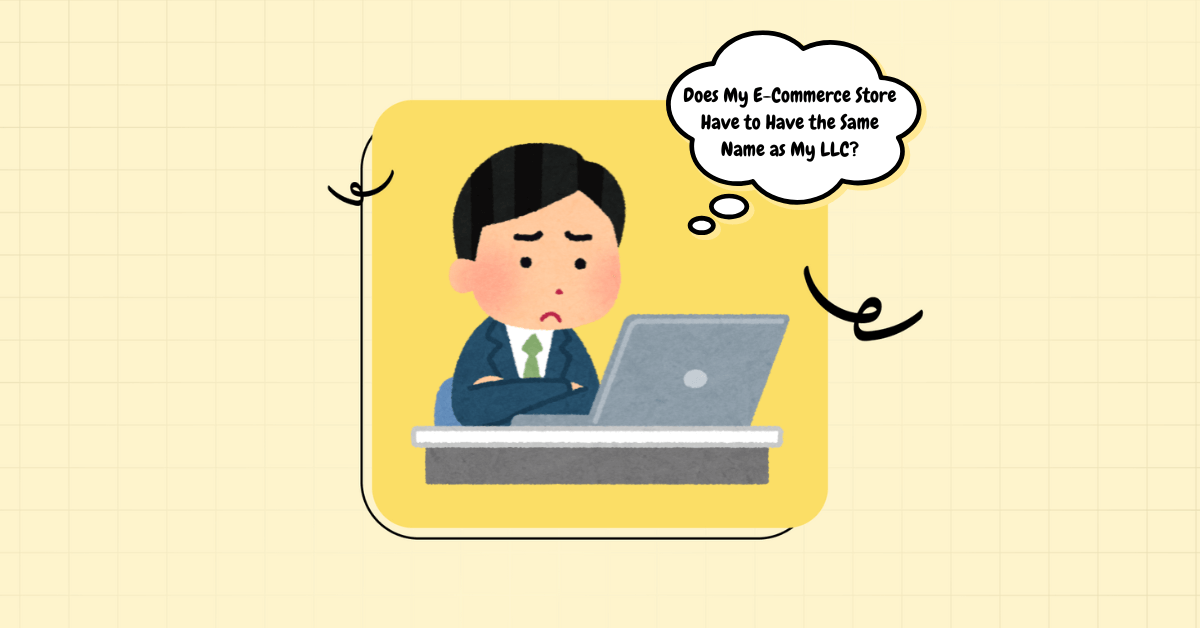Does my e-commerce store have to have the same name as my LLC? This blog answers that head-on: when a different store name is totally fine, how DBAs work, the exact steps to register one, and how to align banking, payment processors, policies, and taxes.

One of the most interesting questions that recently came our formation team’s way was from a founder who had just set up her LLC.
She said,
“I have this generic LLC under my own name, Jane Smith Ventures. But now I want to help run an online store for a brand I have close ties with, Wallet Times Entertainment. With their permission, can I just run the store under that name, say, wallettimes.shop, while keeping my LLC name only in the fine print? Or could that be misleading?”
(Names changed to protect privacy)
That’s how the conversation began. And after some time our experts were able to give her a detailed plan to pick up the best names for her store without messing up legal elements.
And honestly, it’s a doubt so many new entrepreneurs carry in their minds, even if they don’t say it out loud. Because when you start, you don’t really think in legal categories; you think in ideas, in brand names, in possibilities.
And then one day you pause and wonder:
“Wait, does my e-commerce store have to have the same name as my LLC?”
That’s what we’re unpacking here in this blog. If you’ve had the same question swirling in your head while picking names for your business, keep reading. We’ll connect the dots together.
Does My E-Commerce Store Have To Have The Same Name As My LLC?
No. Your e-commerce store name doesn’t have to match your LLC name.
Your LLC is just the legal shell the state knows you by. Your store name is the brand your customers see. They don’t need to be the same thing.
But, if your store name is different, you’ll likely need to file what’s called a DBA (Doing Business As) so it’s clear that both names point back to the same business.
Here’s how we’d put it in simple terms:
- Your LLC name = the name on your driver’s license.
- Your store name = the name you go by with friends.
Both can exist. Both are “you.” But if you want to use the nickname in public, you have to make it official.
LLC Name Vs. Store Name: What’s The Difference?
Here’s the clean split between both:
1) What Each One Is
- LLC Name (Legal Name): The LLC Name is the legal name of your business, registered with the state. This name is used for official purposes like owning the EIN, bank accounts, permits, and inventory, and it’s the entity that would be involved in lawsuits.
- Store Name (Brand/Trade Name): This is the public-facing name your customers see across your website, product packaging, advertisements, and social media. This name can be identical to your LLC’s legal name, or it can be a completely different name.
2) Where Each One “Lives”
- LLC Name: State registry, IRS (EIN), bank/merchant accounts, insurance policies, state sales-tax account, W-9s/1099s, contracts.
- Store Name: Website header/footer, product pages, checkout, receipts, shipping labels, ads, social handles, marketplace listings (Shopify/Amazon/etc.). You can also link it to the legal entity via a DBA/assumed name filing (details below).
3) Who Sees It
- LLC Name: Banks, payment processors, suppliers, the government, and anyone reading your Terms of Service/Privacy Policy/invoices.
- Store Name: Customers and platforms (Google Merchant Center, Meta, marketplaces). It should be consistent across site, emails, and packaging to build trust.
4) What It Controls
- LLC Name Controls: Ownership, liability, taxes, ability to sign contracts, open accounts, hire, insure.
- Store Name Controls: Recognition, positioning, conversion, customer loyalty, chargeback risk (name clarity on statements matters).
5) Where Each Must Appear
Required Placements for Your LLC Name:
This part outlines where your LLC’s name should appear:
- Terms of Service & Privacy Policy: Your full LLC name, including the state of formation and address, must be clearly identified within these documents.
- Invoices, Receipts, and Order Emails: Both your legal LLC name and any “doing business as” (DBA) name you use should be included in these communications.
- Vendor & Logistics Contracts: Always use your complete legal LLC name when entering into contracts with vendors and logistics providers.
- Return/Refund Policy Footer: It’s considered good practice to include your legal name in the footer of your return and refund policies to ensure transparency.
Required Placements for Your Store Name:
Similarly, this section describes where your store’s name should appear:
- Website User Interface (UI): In the header, on product pages, during checkout, and within email templates to ensure consistent branding.
- Card Statement Descriptor: Ideally, the descriptor should start with “STORENAME*something” so customers easily recognize the charge and avoid disputes.
When You Can Use A Different Name For Your E-Commerce Store
As stated earlier, you can use a public brand that’s different from your LLC’s legal name, as long as you make it official with a DBA and keep your disclosures tidy.
When considering how to legally operate your e-commerce store, a crucial aspect is understanding the concept of a “Doing Business As” (DBA) name.
A DBA, also known as a fictitious name, assumed name, or trade name, allows a business to operate under a name different from its legally registered name.
This is particularly relevant for LLCs (Limited Liability Companies) that might want their consumer-facing brand name to differ from the formal legal name used for registration.
Why DBAs Exist?
A DBA connects your brand name to your legal company so that banks, payment processors, regulatory bodies, and customers can recognize the association.
However, a DBA does not establish a new company, offer liability protection, or serve as a trademark.
| 📌 What A DBA Does Not Change (Back-Of-House) A DBA (Doing Business As) is a public alias for your LLC, but it doesn’t change the underlying legal structure. Your LLC remains the legal entity for liability, taxes (IRS/EIN, 1099-K, and returns), and it doesn’t grant exclusive brand rights, which require a separate trademark filing. |
When You Need A DBA
- Your store/brand shown to customers ≠ your LLC name (website header, domain, emails, receipts, or card descriptor use the brand).
- One LLC runs multiple brands (each public name needs its own DBA).
- You operate a site under license for another brand (plus a license agreement and a clear on-site disclosure).
How Do You File A DBA? (Step-By-Step)
Filing a DBA is a relatively straightforward process, but the specifics can vary significantly depending on your location and the type of business entity. Here’s a general step-by-step guide:
1. Determine if a DBA is Necessary
If your e-commerce store’s public-facing name is identical to your LLC’s legal name (e.g., “Acme Products LLC” and “Acme Products”), you generally don’t need a DBA.
Again, if your LLC’s legal name is “Acme Products LLC” but your e-commerce store operates as “The Gadget Emporium,” you will likely need to file a DBA for “The Gadget Emporium.”
Sole proprietorships and partnerships often use DBAs if they want to operate under a business name different from the owner’s legal name(s).
2. Conduct a Name Availability Search
Before filing, it’s essential to ensure the desired DBA name is not already in use. This typically involves searching your state’s Secretary of State database (or equivalent business registration agency) and possibly local county records.
You should also check for trademark conflicts at the federal level with the United States Patent and Trademark Office (USPTO) database, especially if you plan to protect your brand name.
Many states require DBA filings to be done with the Secretary of State or a similar statewide business registration office. This provides statewide protection for your DBA name.
In some states, DBAs are filed at the county clerk’s office where your principal place of business is located. Some states might even require both state and county filings.
3. Complete the DBA Application Form
This form typically asks for:
- The legal name of your LLC (or sole proprietorship/partnership).
- The physical address of your business.
- The desired DBA name.
- A description of your business activities.
- The names and addresses of the owners/officers.
4. Pay the Filing Fee
There is usually a fee associated with filing a DBA, which can vary from a few dollars to over a hundred, depending on the jurisdiction.
5. Submit the Application
Applications can typically be submitted online, by mail, or in person. Ensure all required fields are completed accurately to avoid delays.
6. Fulfill Publication Requirements (If Applicable)
Some states (e.g., California, New York) require you to publish a notice of your DBA filing in a local newspaper of general circulation for a certain number of weeks.
This is to publicly announce that you are operating under a fictitious name. You will usually need to provide proof of publication to the filing authority.
7. Obtain Necessary Licenses and Permits
While a DBA allows you to operate under a different name, it does not replace the need for any specific business licenses or permits required for your industry or location.
You still need to ensure your LLC, operating under its DBA, complies with all local, state, and federal regulations.
8. Renew Your DBA (If Applicable)
DBA registrations often have an expiration date and need to be renewed periodically (e.g., every 1-5 years).
Failure to renew can result in your DBA name becoming available for others to use, or you might face penalties.
Important Considerations:
- Legal Identity: A DBA does not create a separate legal entity. Your LLC remains the legal entity responsible for all contracts, liabilities, and obligations, even when operating under a DBA name. The DBA is simply an alias for your LLC.
- Bank Accounts: Once you have your DBA registered, you can typically open a bank account in the DBA name, but it will be linked to your primary LLC’s Employer Identification Number (EIN).
- Branding and Marketing: A DBA is essential for consistent branding and marketing efforts, allowing your e-commerce store to build a distinct identity separate from the formal legal name of your LLC.
- Credibility: Using a consistent and professional business name (even if it’s a DBA) can enhance your store’s credibility with customers and suppliers.
How to Legally Operate an E-Commerce Store Under a Different Name
Legally operating an e-commerce store under a different name comes down to a few paths. The key ones are:
“Doing Business As” (DBA) Name Registration:
If the public name on your site, emails, receipts, or card statements isn’t your LLC’s exact legal name, you generally must register a DBA in the place you operate.
You should register the DBA name with the appropriate state or county authority. The specific requirements and filing procedures vary by state and sometimes even by county within a state.
Some states require statewide registration, while others only require it at the county level where your principal place of business is located.
Using a Series LLC (in Applicable States):
A Series LLC is a unique type of LLC structure available in a limited number of states (e.g., Delaware, Texas, Utah). It allows for the creation of multiple “series” or “cells” within a single LLC, each with its own assets, liabilities, and, importantly, its own name.
The main Series LLC acts as an umbrella entity. Each series can operate as if it were a separate LLC, even using a different name, while still being part of the larger Series LLC structure.
This means one series could be your e-commerce store, “Store A,” and another could be “Store B,” all under the same overarching Series LLC.
Parent Company/Subsidiary Structure:
While more complex and generally reserved for larger businesses or those with distinct operational needs, an LLC can also own another separate legal entity (such as another LLC or corporation) that operates your e-commerce store under a different name.
In this scenario, your initial LLC would be the “parent company,” and the entity operating the e-commerce store would be a “subsidiary.”
The subsidiary LLC would then register its own name, which would be the name of your e-commerce store.
This provides the highest level of legal separation between different business ventures, each with its own name and liability shield.
It’s most suitable if your e-commerce store is a completely distinct business line with its own management and financial structure.
Steps to Take When Operating Under a Different Name
Regardless of the method you choose, here are essential steps to ensure legal compliance and smooth operations for your e-commerce store:
Identify Who You File With
You’ll need to determine where to file your DBA, as the requirements vary by state. Some states manage DBAs centrally, while others, like California, require filing at the county level.
A few states may even require both. For instance, New York requires LLCs to file an assumed name with the Department of State.
Do a Name Availability Check
Before settling on a different name for your e-commerce store, conduct thorough name availability searches.
This typically involves checking:
✔️ State DBA Register: If you’re filing a DBA, ensure the name isn’t already taken or too similar to another registered DBA in your state/county.
✔️ Trademark Database: Perform a search with the U.S. Patent and Trademark Office (USPTO) to ensure your desired e-commerce name doesn’t infringe on existing trademarks. This is crucial for long-term brand protection.
✔️ Domain Name Availability: Secure the corresponding domain name for your e-commerce store as early as possible.
✔️ Social Media Handles: Check for availability of the desired name on major social media platforms.
Register the DBA (or form subsidiary/series)
Follow the specific procedures for your state/county to register your DBA name. If opting for a subsidiary or Series LLC, complete the necessary formation documents with the relevant state authority.
Update Your E-commerce Platform and Payment Processors
Here’s what you need to do with the following platforms and payment processors:
✔️ Website: Clearly display your registered DBA name (e.g., “Operated by [Your LLC Name], doing business as [Your E-commerce Store Name]”) in your website’s footer, terms of service, privacy policy, and “About Us” page.
✔️ Payment Gateways: When setting up accounts with payment processors (e.g., Stripe, PayPal, Shopify Payments), you will typically register with your LLC’s legal name.
However, most platforms allow you to display your DBA name to customers on their checkout pages and receipts. Ensure this is configured correctly so customers see your e-commerce store’s brand name.
✔️ Bank Accounts: Your primary business bank account should be under your LLC’s legal name. Inform your bank about your DBA name, as they may require this information to accept checks or payments made out to your e-commerce brand name.
✔️ Business Licenses and Permits: Even if you’re operating under a DBA, some local business licenses or permits may need to be obtained under your LLC’s legal name, with a notation that you are operating under your DBA..
✔️ Branding and Marketing Consistency: While you have a different name, ensure consistency in your branding and marketing efforts. Use your e-commerce store’s name for all customer-facing interactions, advertising, and product branding.
✔️ Contracts and Legal Documents: Any significant contracts (e.g., supplier agreements, lease agreements, employee contracts) should typically be signed under your LLC’s legal name, even if the business is commonly known by its DBA.
Keep Taxes/Licenses Straight
Using a DBA name does not alter your tax identity or change your liability in any way. All tax obligations and legal liabilities remain tied directly to your LLC as the primary legal entity.
So, even if you conduct business under a DBA, your tax returns, official tax correspondence, and legal filings must consistently reflect your LLC’s name as the responsible party.
| Quick Bytes: What A DBA Does (And Doesn’t)
Does: Publicly links your store brand to your LLC so banks, processors, regulators, and customers can connect the dots. Doesn’t: Create a new company, change your tax ID, or give you exclusive rights to the name; trademark is separate if you want exclusivity. Still confused? Book a demo with our experts to understand DBA better. |
doola’s Checklist For Trademark & Intellectual Property
- Run a knockout search: USPTO (federal), state marks, plus web/social to spot conflicts.
- Decide on what to protect: word mark (name), design mark (logo), or both; choose the right classes for what you sell.
- File the trademark (DBA ≠ trademark) or calendar when to file (budget, use-in-commerce timing).
- If you’re using a third-party brand, get a written license (scope, assets, termination, territory).
- Keep evidence of use (dated screenshots, packaging, order emails) for filings and disputes.
| Common Mistakes When Operating An E-Commerce Store Under A Different Name:
Here’s a list of common mistakes people make when operating an online store under a different name: ⚠️ Skipping The DBA You must register a DBA (Doing Business As) in the state/county where you operate before publicly using a brand name that differs from your LLC’s legal name. Keep the DBA certificate accessible for authorities. ⚠️ Mismatched Names On Card Statements Customers don’t recognize charges on their card statements because the statement shows the legal LLC name while the website and emails display the brand name. To fix this, set the ‘Legal/Tax Name’ to your LLC name and the ‘Statement Descriptor’ to your brand name (e.g., BRANDNAME*SHOP) in your payment processor. ⚠️ Bank Can’t Accept Brand Payments ⚠️ Running Multiple Brands With One DBA |
Special Considerations That Flip Into Challenges For International Founders If Ignored
If you’re a non-U.S. founder running a U.S. e-commerce LLC (and perhaps using a different store name via a DBA), there are a few extra hoops that you must pay attention to:
EIN (Tax ID) Without An SSN
You can’t use the IRS website for EIN, without a U.S. SSN/ITIN. Apply by phone or fax instead. You may still need an ITIN later for personal filings; that’s a separate W-7 process.
Hidden IRS Filing
If your U.S. LLC is single-member and foreign-owned, the IRS treats it specially: you must file Form 5472 + a pro-forma 1120 each year (even with no income). The penalty for missing/late/incomplete can be $25,000.
BOI (Beneficial Owners) — 2025 Rule Change
As of Mar 26, 2025, FinCEN narrowed BOI reporting to foreign reporting companies (foreign entities registered to do business in the U.S.).
Domestic companies are exempt under the interim rule; foreign reporting companies generally have 30 days after registration to file. Always check the current FinCEN page before you file.
Sales Tax (Even If You Live Abroad)
Many states require you to collect sales tax once your revenue reaches certain thresholds, commonly $100,000.
DBA + “Foreign Qualification
If your foreign company (not a U.S. LLC) wants to use a store name in a state, many states require you to register to do business in that state (foreign qualification) before filing the DBA. Check that state’s exact sequence and fees.
Related read: Tax Implications for Foreign LLC Owners
Launch Your LLC & Brand Confidently With doola

Want the legal setup handled by experts, so you can devote your energy and time to building your brand?
Worry not!
doola simplifies the complex legal processes required to launch and operate an e-commerce business.
This includes LLC formation, obtaining EINs, filing for DBAs, and ensuring ongoing compliance, all designed to seamlessly connect your public brand name to your legal company structure.
Start Your E-Commerce Journey With doola
FAQs

Do I need to trademark my store name if it’s different from my LLC name?
No, not required. But trademarking is how you protect the brand. A DBA links name → LLC; it’s not brand ownership.
Can I run multiple stores under one LLC?
Yes. If each store uses a different public name, file a separate DBA for each and keep clean, separate accounting.
Will my customers ever see my LLC name?
Usually only in fine print (policies/invoices). Set your card statement descriptor to the brand so statements show the store name.
How do I register a DBA for my LLC?
Search availability → file with the state/county → pay fee → publish if required → get the certificate → update bank/processor/site.
Does having a different store name affect taxes?
No. Your EIN and tax filings stay with the LLC. Sales-tax and income-tax obligations don’t change because of the brand name.
What if my LLC name is taken as a domain? Can I still operate under another name?
Yes. Use a brand/domain you can get and file a DBA to link it to your LLC.
Can I change my LLC name later if I rebrand my store?
Yes, via a state amendment, then update IRS, bank, licenses, contracts, and platforms. Or keep the LLC name and just add a new DBA.
Can one LLC run multiple stores without DBAs?
If they share the same public name, maybe. If they use different names, you generally need a DBA for each.
What happens if DBAs aren’t accepted by payment processors?
Share the DBA certificate and a bank letter showing “LLC Legal Name DBA Brand,” and set the brand descriptor. If they still refuse, switch processors or form a separate entity.
How do I handle rebranding legally And operationally?
File the new DBA (retire the old when done), update bank titles and processor descriptor, change footer/policies/invoices, 301-redirect domains, update marketplaces and email sender, and announce the change to customers.









